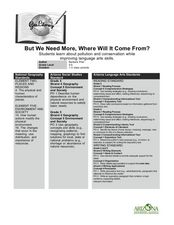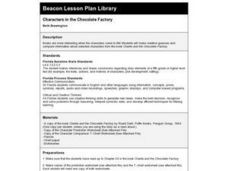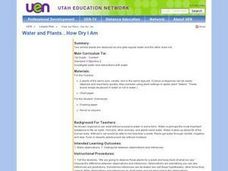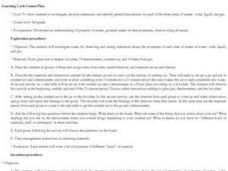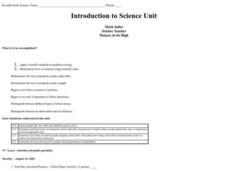Curated OER
But We Need More, Where Will It Come From?
Students write a persuasive letter and create a poster about pollution and conservation. In this pollution and conservation lesson plan, students learn how humans are the number 1 cause of pollution.
Curated OER
Famous Mathematicians/Database
Students analyze a math database and uncover facts. In this algebra instructional activity, students investigate the lives of famous mathematicians using facts they find about the different authors. They gain a new...
Curated OER
Graphing Scatterplots
Students examine scatterplots and determine the equation of a line using the slope-intercept method. Students interpret graphs, draw inferences, and sketch a curve of best fit for the graph. Based upon patterns in the graphs, students...
Curated OER
Mystery of the Maya
Students examine a piece of pottery and make conclusions about the culture. They demonstrate the skills used in digging at a dig site. They also make inferences about the responsibility archaeologists have when excavating a site.
Curated OER
Advertising Through the Decades
Twelfth graders compare and contrast advertising styles and motives from 1920 to present. Using internet research and print advertisements students make comparisons and inferences about the function of marketing. At the culmination of...
Curated OER
The Bernoulli Effect - Conceptually
Students observe and/or conduct five experiments which address the Bernoulli Effect. In this conceptual instructional activity based on the Bernoulli Effect, the students construct atomizers, and make concrete observations and inferences...
Curated OER
Finding Buck Henry
Students read and demonstrate competence in the general skills and strategies of the writing process via the novel "Finding Buck Henry." They recognize complex elements of plot. Students analyze devices used to develop characters in...
Curated OER
Characters in the Chocolate Factory
Students dress and act as selected characters from Roald Dahl's "Charlie and the Chocolate Factory". They identify each other and make predictions about the upcoming chapters based on their observations about the characters.
Curated OER
Crickets Guided Discovery
Sixth graders investigate insect anatomy by analyzing a live cricket. In this insect science instructional activity, 6th graders discuss their knowledge of insects and describe their characteristics from memory. Students...
Curated OER
Clouds and the Weather
Fourth graders analyze the relationship of clouds and local weather. Students also observe and record cloud data and weather conditions daily as they research different cloud types. The data is analyzed looking for trends in daily...
Curated OER
Water and Plants...How Dry I Am
First graders observe two similar plants as one gets water and the other does not. They make predictions and chart the growth of each. They draw pictures of the plants after one week.
Curated OER
What Can We Learn From the Past?
Students observe items from their past, making inferences and observations about their own culture based on these artifacts. Students then share with the class what they learned about their own culture, giving all students more...
Curated OER
Statistics and Probility
Seventh graders collect data and make predictions. In this geometry instructional activity, 7th graders work in tiers collecting data and plotting it. They make inferences and predictions about their collected data.
Curated OER
Acid Precipitation
Students test the acidity of unknown solutions. They use this information to make inferences from data given from recorded rainfall records to identify areas that receive the most acid rain.
Curated OER
Scientific Inquiry
Students make inferences about what activities occur at different places in school. They form a hypothesis as to how space is used. They simulate how archeaologists explore past people by designing and conducting a research project.
Curated OER
Learning Cycle Lesson Plan
students investigate, develop inferences, and identify general descriptions for each of the three states of matter - solid, liquid, and gas. students investigate water, by observing and stating inferences about, the properties of each...
Curated OER
Inquiry Lesson About Color
Students investigate the color choices artists make in their work, and to practice the scientific process of predicting, observing, inferring, and interpreting. This lesson's purpose is to prepare students for a museum visit.
Curated OER
Color Dots 3
Students make simple observations, test mixtures, and make generalized inferences from their observations. They observe bleeding of colored inks with water.
Curated OER
Pulse
Students determine a baseline pulse rate then chart the changes in rate with exercise. They describe the changes and develop a rationale for their observations. The task assesses students' abilities to make simple observations, determine...
Curated OER
Escape The Hangman
Seventh graders investigate the concept of probability. They use the game of hangman to create engagement and context for conducting the lesson. They create a spreadsheet with data that is given. Students make predictions based on data.
Curated OER
Introduction to Science
Seventh graders investigate scientific methods to solve problems. They demonstrate creating data tables and graphs. They study the role of a scientist and the importance of safety in a science lab. They distinguish between an...
Curated OER
Clues to the Past
Students analyze how arhaeologists study the past. They define basic archaeological terms, make general inferences from observations, and explain the importance of context.
Curated OER
What Happens on Average
Fifth graders are introduced to convergence of sequences based on averaging previous terms in the sequence. The power of the "fill-down" function in spreadsheets is exploited. By using various starting numbers, and inferring the limit,...
Other popular searches
- Making Inference in Math
- Teaching Making Inference
- Making Inference Handout
- Making Inference Using Art
- Making Inference Worksheet
- Inference and Prediction
- Making Inference Review Game
- Making Inference Lessons
- Lesson on Making Inference
- Making Inference Using Coin
- Making Inference: Reading
- Making Inference Seuss


